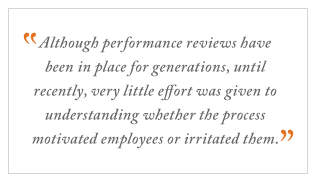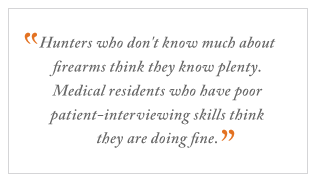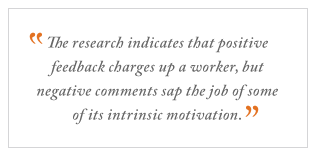The way some performance evaluations are conducted, the employee and the company would be better off without them. Consider the case of "Don," an anonymous employee of an unnamed company, who posted his experience as part of an online contest looking for the worst appraisal. By the time February rolled around, past the deadline for conducting performance reviews for the previous year, Don was wondering when or whether his boss would make time for the discussion. It took him by surprise to get such ostensibly important feedback in the men's room.
 |
"I happened to be entering the men's bathroom at the same time as my boss," he wrote. "Standing side-by-side at adjacent urinals, he remarked that he hadn't had a chance to go over my review with me, but now was as good a time as any." Don's manager said that he and others in the company were pleased with Don's work. The setting didn't quite convey genuine appreciation for Don's work. "All of this was bad enough, and a bit humiliating since we were not alone in there, but the summation was really priceless," he wrote. "Walking away from the urinal, he told me to 'keep it up' in the new year."
Don doesn't work for that company anymore.
His situation is extreme, but much of the humor in it stems from the problems with performance appraisals. Little in human nature prepares an employee or manager for the artificial aspects of the typical review. Many managers detest appraisals and delay them, implying to the employee that he or she is not important. The usual forms are just that: forms -- impersonal, one-size-fits-all, procedural, and lawyerly.
The Eleventh Element of Great Managing is measured by the statement "In the last six months, someone at work has talked to me about my progress." Some people think a thorough and accurate performance appraisal will suffice. But it's not enough. The most engaged employees say that their managers so regularly give them carefully considered advice and encouragement that when the time arrives for the formal evaluation, there are no surprises.
An untested assumption
Although performance reviews have been in place for generations, until recently, very little effort was given to understanding whether the process motivated employees or irritated them. "One may develop the most technically sophisticated, accurate appraisal system, but if that system is not accepted and supported by employees, its effectiveness ultimately will be limited," states one summary of the research. Another finds that "a statistical review of the evidence supporting the use of feedback (such as performance appraisal) suggests that providing personnel with feedback is like gambling in the stock exchange: On average, you gain, yet the variance is such that you have a 40% chance of a (performance) loss following feedback."
Many organizations implemented some version of a "balanced scorecard" following the logic outlined in Robert Kaplan and David Norton's 1996 book of the same name. The book can be found in nearly every personnel department of the world's largest corporations. Its logic is watertight: Long-term profitability is the product of a multivariate equation; a company's managers must pay attention to, and the scorecard must incorporate, many different aspects of the business if they are to perform as well as possible.
However, this ideal proves elusive when placed in the hands of human managers and employees. "Despite survey evidence that a growing number of firms are using balanced scorecards for compensation purposes, relatively little is known about the implementation issues associated with scorecard-based reward systems," wrote three University of Pennsylvania professors who scrutinized a bank that tried and then abandoned a balanced scorecard.
In the case of the bank, the judgment given to managers apparently backfired when they monkeyed with the math, disregarding factors that were predictive of financial success and incorporating factors that were not, and changing the criteria from quarter to quarter. "This evidence suggests that psychology-based explanations may be equally or more relevant than economics-based explanations in explaining the firm's measurement practices," wrote the researchers.
Once again, human nature trumped the best laid plans of corporate strategists. Such bumps along the way are not an indictment of balanced scorecards, but they do demonstrate that any corporate strategy is only as good as the managers who bring it to life in the day-to-day routines of the teams they supervise.
Several recent twists make performance appraisals more interesting, if not more effective. For example, 360-degree feedback injects a juicy aspect of gamesmanship into the process, allowing underlings to fire back at bosses or sideways at colleagues. Such systems are more likely to grade style rather than substance and usually focus on weaknesses rather than strengths. The practice of asking employees to assess themselves presents its own dilemma. "The idea of this workplace ritual that is gaining popularity is to help managers and employees level with each other, applaud achievements, set new goals and identify job-training needs," wrote columnist Jared Sandberg in The Wall Street Journal. "But these self-evaluations have instead been put on the list of annualized torments, ranking up there with taxes and dental probes. There are, after all, an infinite number of ways to self-incriminate."
"Ostensibly," he continued, "you rate yourself on a scale from one to five, usually in preparation for a follow-up interview. But let's be frank. You really end up portraying yourself in one of two ways: A) Self-flagellating lummox dumb enough to enumerate weaknesses that can be used against you at a later date. B) Self-aggrandizing egomaniac who thinks 'no' means 'yes,' insults are a form of flattery -- and you're pretty good-looking to boot."
The caveat given by "Dilbert" creator Scott Adams has plenty of truth in humor. "The key to your manager's strategy is tricking you into confessing your shortcomings. Your boss will latch on to those shortcomings like a pit bull on a trespasser's buttocks. Once documented, your 'flaws' will be passed on to each new boss you ever have, serving as justification for low raises for the rest of your life."
The rampant lack of self-awareness
More troubling, self-evaluations are likely to be terribly flawed. "People are not adept at spotting the limits of their knowledge and expertise," wrote four researchers from Cornell University and the University of Illinois at Champaign-Urbana in a report with the confidence-building title "Why People Fail to Recognize Their Own Incompetence." "Indeed," they wrote, "in many social and intellectual domains, people are unaware of their incompetence, innocent of their ignorance. Where they lack skill or knowledge, they greatly overestimate their expertise and talent, thinking they are doing just fine when, in fact, they are doing quite poorly."
 |
After administering a sophomore-level psychology exam to 141 of their students, the four professors asked the students to estimate their absolute scores and their performance on the test relative to the rest of the students. The students in the bottom quarter of the class on the test thought they were well above average. Those who did worst on the test overestimated their performance by about 30%.
The dilemma -- the "double curse," the researchers called it -- is that some of the very abilities that make a person good at performing a job are the same abilities needed to realize whether he is failing or succeeding. If an employee isn't talented, knowledgeable, or skilled enough to do a good job, there's a good chance he's not talented, knowledgeable, or skilled enough to know he's blowing it, and he floats around naively thinking everything is fine.
This form of unconscious incompetence is not restricted to taking psych tests in college. Other research has found the same problem with people's assessment of their ability to think logically, write grammatically, or spot a funny joke. Hunters who don't know much about firearms think they know plenty. Medical residents who have poor patient-interviewing skills think they are doing fine, as do medical lab technicians assessing their knowledge of medical terminology and problem-solving skills. Even if the researchers offer a $100 incentive for a subject to give them the cold, hard truth, people give inflated self-assessments, apparently because they sincerely believe they are that good.
The Cornell and Illinois researchers also made an intriguing discovery on the other end of the scale. While those at the top of the class accurately estimated they did well on the test, they did not realize their accomplishment was unique. They suffered an "undue modesty." "Top performers tend to have a relatively good sense of how well they performed in absolute terms, such as their raw scores on a test," they wrote. "Where they err is in their estimates of other people -- consistently over-estimating how well other people are doing on the same test."
These results show how imperative it is that a manager, coach, or mentor be able to hold up the mirror to an employee. The ray of hope in the "double curse" is that once a research subject is educated on the difference between good and poor performance, he becomes more conscious of where he is failing.
"We gave roughly half of the participants a mini-lecture about how to solve this type of logic problem, giving them skills needed to distinguish accurate from inaccurate answers," wrote the social scientists. "When given their original test to look over, the participants who received the lecture, and particularly those who were poor performers, provided much more accurate self-ratings than they had originally."
Help me develop my strengths
║┌┴¤═° inquired into the proper balance between a manager focusing on strengths and positive news or weaknesses and negative news in a manager's discussions with subordinates. The research found that a manager who focuses on his employees' strengths essentially inoculates them from being actively disengaged. Those who focus on weaknesses get more polarized results; the strategy rarely works as well as a more positive view, but the manager gets credit for at least "focusing" on the individual. The worst performing managers were those who, by essentially ignoring their team, fail the Eleventh Element. One-fourth of all employees, and nearly two-thirds of those who are actively disengaged, say their boss is asleep at the switch. (See "Strengths: The Next Generation" in the "See Also" area on this page.)
 |
For all the complexity of performance appraisals -- the balanced scorecards, the 360-degree feedback, the self-evaluations and forced grading systems -- the statement that shows the best connection between perceptions of evaluations and actual employee performance is remarkably simple: "In the last six months, someone at work has talked to me about my progress." The statement does not specify that the discussion is an official review, but an appraisal can be one ingredient in creating the requisite feedback. The two are related, but not synonymous.
More important to the employee and to the business is that the employee understands how he is doing, how it is being perceived, and where his work is leading. In some ways, this statement is a long-term complement to the Fourth Element of managing, which focuses on more immediate "recognition and praise." (See "The Fourth Element of Great Managing" in the "See Also" area on this page.)
There is nothing wrong with a formal evaluation process per se, and much to recommend it. Roughly 7 in 10 working Americans say their company has a formal performance review process. The odds of creating high engagement are better, but far from perfect, in businesses with a formal process. The deadlines, the forms, and the threat of Personnel or a boss coming after them appear to force the issue with front-line managers, making many have a progress meeting with employees when none would have taken place otherwise (serendipitous encounters in the men's room notwithstanding). Companies that implement or tighten appraisal procedures typically see an increase in the Eleventh Element from poor to modest levels, but they never achieve high levels on the strength of appraisals alone.
With any formal appraisal cycle that links ratings to pay, which is the case for 54% of U.S. workers, there is an ever-present risk that the system will have enough real or perceived flaws that it actually erodes employee engagement. One study of government workers in a Midwestern U.S. county found that "burnout" was more likely among those employees who believed their new appraisal and merit pay system were unfair. "Employees need to think that how they will be compensated by a system is based on merit, rather than other, extraneous factors," said the study.
Feedback changes perceptions of pay
Four out of five employees whose companies have a formal review system feel it is fair. However, these perceptions are strongly affected by what happens between the appraisals. The proportion who feel the system is fair drops to two-thirds if they feel no one has talked to them about their progress. Conversely, if a manager can maintain a strong, regular discussion of progress, 9 in 10 workers will consider the review system fair.
The consequences on either end of the scale are important. When a manager is regularly checking in with an employee, that employee is more likely to consider herself properly compensated for her work, more likely to plan on staying with the company, and more than twice as likely to recommend the company to others as a great place to work.
When compared with business results, the Eleventh Element turns out to be particularly powerful in driving productivity and safety. Business units in the top quartile on this element realize 10% to 15% higher productivity and 20% to 40% fewer accidents than bottom-quartile business units. Yet less than half of employees in the global database strongly agree that someone talked to them about their progress in the last six months. Even among executives and senior managers, the proportion is only one-half.
On a purely functional level, an employee appraisal is quite simple. Observe an employee's progress over the course of the year, record it carefully on the company-supplied form, inform her at the required interval of the results, and expect her to make the necessary corrections to improve next time around. If only she were a machine, the program would work perfectly. (See "When Engaged Employees Meet Engaged Customers" in the "See Also" area on this page.)
In practice, a good performance evaluation is a form of interpersonal art that requires managerial talent and careful preparation. Whether the employee feels she has a voice in the process is even more crucial than the functional aspects of her participation. A manager must maintain a delicate balance between giving candid, objective feedback and not crushing the employee's spirit and confidence.
The research indicates that positive feedback charges up a worker, but negative comments sap the job of some of its intrinsic motivation. Comments from peers or subordinates must be interpreted carefully -- filtered of grudges, jealousy, and erroneous observations. A good reviewer needs to avoid the natural inclination to give too much weight to the outcome regardless of whether the employee did the right thing to get there or just got lucky.
And, most of all, the discussion must be tailored to the personality, the circumstances, and the potential of the employee. A drive-by performance evaluation just doesn't cut it.